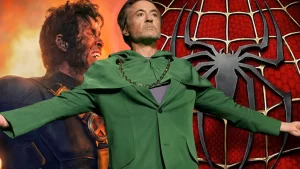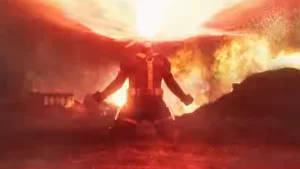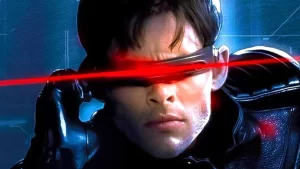Reboot Off the Port Bow!
A Film Review of X-Men: First Class
By: Lawrence Napoli
 Before seeing this film (and reading this review) you, the reader, must identify yourself in one of three groups of people: 1) X-Men fan boys/girls – you know everything there is to know about the comics, the cartoon shows, the expansions, the previous films and the alternate universes. 2) Casual X-fans – you are aware of a decent amount of pop culture and entertainment to know who the important characters are, and the general idea of persecution and the struggle for acceptance that the overall X-message is about. 3) Everyone else – you may or may not have any semblance of passing interest in X-Men, but you certainly know Hugh Jackman used to be the face of the film franchise. I am well versed in many aspects of geek culture, but if put to the true test, I would most certainly fail a detailed quiz of all things X. Therefore, I shall classify myself as a casual fan whose main draw to the X-Men is the overall story’s ability to incorporate hundreds of unique individuals amidst the backdrop of ever changing trends in society, while never losing sight of the theme of isolation felt by mutants as individuals and as a social group.
Before seeing this film (and reading this review) you, the reader, must identify yourself in one of three groups of people: 1) X-Men fan boys/girls – you know everything there is to know about the comics, the cartoon shows, the expansions, the previous films and the alternate universes. 2) Casual X-fans – you are aware of a decent amount of pop culture and entertainment to know who the important characters are, and the general idea of persecution and the struggle for acceptance that the overall X-message is about. 3) Everyone else – you may or may not have any semblance of passing interest in X-Men, but you certainly know Hugh Jackman used to be the face of the film franchise. I am well versed in many aspects of geek culture, but if put to the true test, I would most certainly fail a detailed quiz of all things X. Therefore, I shall classify myself as a casual fan whose main draw to the X-Men is the overall story’s ability to incorporate hundreds of unique individuals amidst the backdrop of ever changing trends in society, while never losing sight of the theme of isolation felt by mutants as individuals and as a social group.
It is important to be honest with yourself regarding this because it will determine the extent to which seeing X-Men: First Class will enrage/please you. More hardcore fans tend to be less open to liberties taken with the established cannon. For instance, if a vision of X-Men were ever to arise that features Logan sporting a pink dress as casual attire and the need to picket outside Marvel’s offices erupts within; chances are, you are pretty hardcore. That’s not to say this film goes to such absurd lengths to separate itself from everything you may know and possibly love about the X-Men, but be forewarned: this is a very unfamiliar world to EVERY level of fan featuring several core characters being ripped completely out of familiar timelines. Two things hold this production together. First, there is enough of the familiar in terms of characters, costumes, effects and situations to qualify this film as an X-Men story as opposed to say, TMNT. Second, the key relationship between Xavier and Magneto is an intriguing and compelling dynamic, and is showcased so well that most plot gaps are instantly forgiven by this film’s end.
The influence of Bryan Singer is pervasive in X-Men: First Class before the film even begins by showing the animated intro of the iconic lineup of his best film (The Usual Suspects) for his Bad Hat Harry production company. Love him or hate him, Singer certainly took his prestige to the next level with the success of the first two X-Men films. The problem is Bryan Singer is not the director here. That honor belongs to Matthew Vaughn who happens to be more versed in the duties assigned to a penny pinching producer as opposed to an auteur behind the camera. Regardless, Singer’s penchant for rooting the physically impossible within the most realistic and identifiable framework persists in First Class, and apparently connecting the mutant phenomena to the fear and paranoia that brought the world to the brink of war during the Cuban Missile Crisis was the order of the day. Yes, yes, it was quite clever of Singer, Vaughn and writers, Ashley Miller, Zach Stentz and Jane Goldman, to make such an obvious parallel between the fears of communists, nuclear war and hinting that those exact fears will connect to the (as yet) unknown mutant threat. My specific problem with this tactic is that the fear of persecution felt by every mutant in First Class makes no connection with the aforementioned fear. The fear that is faced by most of the mutants is the specific result of varying degrees of personal insecurity in regards to physical or behavioral abnormality. Only Magneto is shown to be victimized by persecution via the Holocaust. Communicating the concept of fear in this exact matter is the heart of any X-Men story, but using the Cuban Missile Crisis as a backdrop to this largely internal conflict was unnecessary window dressing for the plot.
The rest of the story plays out as if it were X-Men Origins: Magneto, as his quest for vengeance connects every subplot to each other, while fulfilling the role as the main protagonist. Sorry X-Fans, it seems even in his youth, Charles Xavier cannot be imagined in a role outside the confines of “the mentor.” While the personal grudge between Magneto and Sebastian Shaw leads the audience to all sorts of fun-filled, eye-candy fight sequences featuring superhuman powers, it is the relationship between Xavier and Magneto that gives First Class a significant touch of elegance. This interplay allows James McAvoy and Michael Fassbender to break out of their green screen pantomime for a few minutes to deliver some high caliber acting, and both men are to be applauded for their efforts because their performances easily match those of Patrick Stewart and Ian McKellen. McAvoy’s particular strength lies in his natural charisma while maintaining a clear sense of duty and responsibility throughout. Fassbender, ever the rogue, manipulates an edgy coldness that makes Emma Frost look like Betty Crocker, at times. But when Xavier appeals to Magneto’s humanity, Fassbender’s ability to completely shift demeanor into a man more like Xavier himself is truly a sight to see on screen as the love fest takes full effect. These characters and their performances were so good that the movie should have been completely rewritten to focus on them entirely. I also have to give serious kudos to Kevin Bacon as Sebastian Shaw, because I was fully expecting a “mailed in” Hollow Man performance, but he delivered a very satisfactory blend of smug deviltry that comes very close to matching the negative energy of Fassbender’s Magneto.
Unfortunately, First Class is still an X-Men film, which means it must be littered with as many extra characters that have no hope of impacting the narrative in a positive way due to shear character overload and the premium of screen time. I seriously would have thought that Bryan Singer would have learned this lesson by now. It seems that the temptation to revert to the old formula of adding as many Easter Eggs as possible (proven to always have a negative impact on the overall quality of your story) is seemingly impossible to overcome. As a result, the only secondary characters that have a chance at legitimate moments on screen are Jennifer Lawrence as Mystique and January Jones as Emma Frost.
Lawrence’s Mystique comes off as quite innocent, friendly and fun – characteristics that have never been associated with the shape shifting assassin, but somewhat refreshing to see her in this new light. Of course, sweet little Mystique cannot stay that way for long because her natural form (an exact reproduction from previous X-Films) is the source of her insecurity as a mutant and the gateway for other emotions like fear, betrayal and vengeance. Jennifer Lawrence does an acceptable job at portraying this character as a teenager/young adult, but this aspect of her performance pales in comparison to when Mystique becomes a little more assertive with her growing attraction to Magneto. She’s not exactly Rebecca Romijn (or is she?), but produces shades of seductive greatness that reveals an image of a young woman finally coming into her own (good or bad/right or wrong).
January Jones is a beautiful, beautiful woman, and I seriously don’t care if critics regard her acting prowess as less than polished. She is perfect for her role on Mad Men, and beyond capable of portraying Emma Frost, the White Queen. The appearance of this character above all others has been anticipated since Bryan Singer first started the X-Film Franchise, and it seems this anticipation is the only reason that the Hellfire Club was incorporated into First Class because truly, any selection of villains would have sufficed as every character outside of Xavier and Magneto seemed an arbitrary choice. Although I would have developed a never ending crush for January had she been capable of producing some sort of an English accent for Frost; we don’t live in a perfect world and First Class is not a perfect film. Oh boo hoo, January Jones isn’t Meryl Streep! Guess what, no American actress (not even Natalie Portman) is close to Streep, so January uses what she’s got. She was an Abercrombie and Fitch model for crying out loud, so she at least knows how to act like a cold hearted, disinterested b*tch; which (BTW) is perfect for Emma Frost. I particularly respected how she was not intimidated by Fassbender (as Magneto) during the interrogation scene. In many respects, deadpan stoicism is the best way to counter pure rage because even if you are in a physical position of weakness, it can illicit the illusion of control – and that’s what the White Queen is all about.
The special effects in First Class are a tad hit and miss. For instance, all of the digital effects employed to manifest the various mutant powers are quite impressive. My favorite was the application of Banshee’s powers and the “Idiot’s Guide to Flying with Sound Waves,” that accompanied his character’s exposition. Yes, after all these years, I finally understand how he does it. But then we get into costume design, specifically the blue furry version of Hank McCoy, and I continue to be unimpressed with costumed prosthetics as an attempt to showcase a much more physically imposing presence (please note: this is my largest concern for the Bane angle in the next Chris Nolan Batman film). Too many equate the viability of fully CG rendered characters with the lost potential of the Star Wars prequel films. Yes, Jar Jar was in desperate need of a light saber through his skull, but other characters (like Watto) showed that a computer could deliver a quality performance in limited bursts of screen time. I was also unimpressed by the special effects applied to much wider shots, such as the fabricated naval standoff during the blockade sequence of the Cuban Missile Crisis. The boats looked rather pedestrian in detail and probably should have consulted Pirates of the Caribbean on how to stage a naval battle.
The final verdict is that X-Men: First Class is a very average action/adventure/special effects film that pays little (if any) homage to the source material. There will be no surprises when the film underperforms at the box office despite featuring an overall upgrade when it comes to the cast’s performance. An audience’s acceptance is vital for a franchise reboot so soon after the original films have come and gone. Perhaps a longer moratorium on engaging these kinds of quickie reboots needs to be accepted by Hollywood as one of those unwritten rules. I kept thinking to myself how it was too soon to completely discard the original X-Films because they were so good (overall). That mind set bridged me to thinking about time in general and how silly I thought it was to introduce the concept of mutants at this specific period in US history without making an overt thematic connection to those events within the framework of the narrative’s conflict. If Bryan Singer wanted to make a better push for filming X-Men 4, then he should have taken some bigger conceptual risks in rebooting the X-Franchise. My suggestion would require a testicular fortitude, vision and writing skills that few (if any) creative minds currently employed in Hollywood would be capable of conceiving, let alone executing: a live action film version of The Age of Apocalypse.







